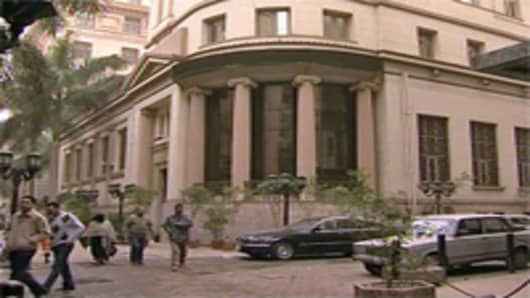The nomination of a senior member of the Muslim Brotherhood to run in Egypt's presidential race has further clouded an already complex political transition, making an immediate economic recovery less likely and heightening the risk of a currency crisis, according to analysts.
Khairat Al-Shater, a wealthy businessman and long-time member of the Muslim Brotherhood, becomes the third Islamic candidate to participate in the country's first presidential elections since the fall of Hosni Mubarak last year. The vote is slated to begin on May 23.
"The announcement of Mr. Al-Shater as the official Muslim Brotherhood/Freedom and Justice Party candidate for president means that the race will be more open than we might have assumed, even a few weeks ago," Angus Blair, Chairman of the Signet Institute, a Cairo-based think tank, told CNBC.
After a long-standing commitment not to field a candidate, the decision marks a policy reversal for the Muslim Brotherhood (MB). The move may further reflect a growing divide between the ruling military council and the MB, as well as rifts from within, analysts said.
"The change of plan could give the impression to international observers that the political transition may be turning messy and heighten the risk of a derailment in the process," Philippe Dauba-Pantanacce, senior economist, Turkey, Middle East and North Africa at Standard Chartered Bank, said.
Against such a backdrop, and the running dispute on how a new constitution should be drafted, the Egyptian economy continues to struggle. Both inflationand unemploymentare high while sources of hard currency, such as tourism, are still far off pre-revolution levels.
"I would be comforted if the body politic was working in unison to resolve these issues, but serious political economic debate is not happening enough to give me enough confidence currently," Blair added.
Dwindling Reserves
Dwindling foreign currency reserves, largely attributed to a monetary policy committed to defending the value of the Egyptian pound, have kept many on edge.
Dauba-Pantanacce warned that time was running out.
"The currency situation has reached a level that could become critical and/or slip into a sudden currency crisis; a disorderly steep devaluation in a matter of a few days or weeks," he said.
Data from the Central Bank of Egypt (CBE) on Monday showed that reserves fell from $15.72 billion in February to $15.12 billion in March. The rate of deceleration remains volatile, albeit the loss comes in at 16.6 percent so far this year and over 50 percent versus a year earlier, with the central bank believed to be throwing dollars in the market to support the pound.
Late Monday, the Egyptian pound traded at 6.03 against the US Dollar , marking a depreciation of less than four percent since January 2011.
The current level of reserves, including some $4 billion in gold, would technically be equivalent to about three months of imports, the level recommended by the International Monetary Fund (IMF) . But a more realistic import equivalent is seen by Dauba-Pantanacce at two months, as he argues that the gold is unlikely to be converted into currency to finance imports.
Government financing has been equally troubled. Many projects have been put on hold, with the deteriorating state of Cairo's already congested road network serving as one of many daily reminders.
In the latest round of Treasury bills auctioned by the Central Bank, yields eased slightly, from 15.829 percent to 15.642 percent for the 273-day bill. Prospects of reaching an agreement with the IMF on a $3.2 billion loan remain unclear due to a largely opposed public and parliament. Still, officials have said that progress was being made, and that a deal could be signed by June.
Shater's candidacy was met with a 1.4 percent drop in Egypt's benchmark stock index on Sunday, followed by a 0.17 percent rebound on Monday. Despite the hurdles, the index has gained over 35 percent so far this year, outperforming most of its global peers.
--------------------------
Yousef Gamal El-Din is CNBC's Middle East Correspondent and contributes to the channel’s flagship shows, as well as analysis for CNBC.com.
Stay in touch with him on Twitter at http://www.twitter.com/youseftv @youseftv


